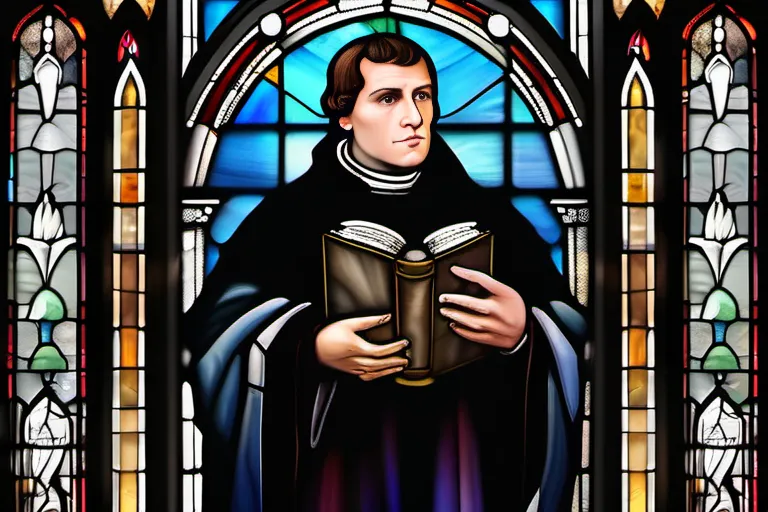Understanding the fundamental tenets of Lutheranism
This article delves into the core beliefs and practices that define Lutheranism, a significant branch of Christianity. We’ll explore its history, key doctrines, and unique aspects.
The Origins and History of Lutheranism
The origins of Lutheranism can be traced back to a tumultuous period in European history, specifically during the 16th century when a monk named Martin Luther sparked a revolution that would change the course of Christian history forever. Was it just a coincidence, you might wonder, that this upheaval occurred at such a pivotal moment? Or was there something deeper at play?
Luther’s journey began in the shadows of the Roman Catholic Church’s excesses and rigid practices. He had questions about the meaning of his faith and the nature of salvation. One fateful day, he nailed his Ninety-Five Theses to the door of All Saints’ Church in Wittenberg, Germany. This act was not just a challenge but a declaration—a spark that ignited a wildfire across Europe.
The Reformation era was marked by intense debate and upheaval. Luther’s teachings spread rapidly through pamphlets, sermons, and eventually printed books made possible by the invention of the printing press. How did this one man’s voice resonate so widely? It wasn’t just his arguments; it was also his charisma and the way he articulated complex theological concepts in a language that everyone could understand.
Theological debates between Luther and other reformers like Ulrich Zwingli and John Calvin led to distinct branches within Protestantism. But at its core, Lutheranism remained true to Luther’s principles of sola scriptura (scripture alone) and sola fide (faith alone). These beliefs laid the groundwork for a church that emphasized individual piety and the direct relationship between God and man.
As we explore further into the history of Lutheranism, it becomes clear that its roots run deep. They are not just historical events but also spiritual movements that continue to shape Christian thought today. How can such a movement have such enduring relevance? Perhaps because at its heart lies a simple yet profound truth: faith in Christ alone can bring salvation.
Key Doctrines of Lutheranism
What defines Lutheran beliefs? When we talk about Lutheranism, one cannot help but delve into its core doctrines—those fundamental teachings that set it apart from other Christian denominations. Let’s explore some of these key doctrines through a lens that might resonate with you.
Justification by Faith Alone: This doctrine is perhaps the most well-known and pivotal in Lutheranism. Imagine, for a moment, faith as a bridge over turbulent waters. On one side lies our sinful nature, and on the other, divine grace. According to Martin Luther, we are saved not through works or rituals but solely by faith. This means that it is by believing in God’s promise of salvation, rather than performing actions, that we can stand before Him. How does this shift our understanding of salvation?
The Two Kingdoms: Another profound concept within Lutheranism is the idea of the two kingdoms. Picture a vast landscape divided into two distinct regions: one marked by spiritual governance and another defined by temporal rule. In the spiritual realm, Christians are subjects to Christ’s kingdom, where law is replaced by grace. Conversely, in this earthly domain, governed by secular authorities, both believers and non-believers must adhere to the laws of society. This division helps us navigate life’s complexities, recognizing that our faith should guide our spiritual lives while societal roles dictate temporal responsibilities.
The Priesthood of All Believers: Finally, consider this: each individual has a direct line to God through faith. In Lutheran theology, the priesthood of all believers means that every Christian is both a minister and a parishioner in their own right. It’s like being part of a vast, interconnected network where everyone contributes to the collective spiritual health of the community. How does this shift your view on the role of clergy within the church?
These doctrines are more than just abstract concepts; they shape how Lutherans understand and interact with the world around them. By exploring these fundamental tenets, we begin to grasp the depth and breadth of Lutheran beliefs.
Lutheran Worship and Liturgy
Lutheran worship is like a symphony, where every note and every chord serves to harmonize the melody of faith. Imagine a church service as the grand stage for this musical journey – one that seamlessly blends hymns, liturgical practices, and sacraments into a cohesive experience.
When you step inside a Lutheran church, the first thing you might notice is the hymns echoing through the space. These aren’t just any songs; they are the heartbeat of Lutheran worship, often accompanied by the rich tones of an organ. Think of these hymns as the verses in your favorite book – each one carries its own message and beauty.
The liturgical practices in Lutheranism, such as the confession, are like the structured framework that holds this musical symphony together. They provide a sense of order and solemnity, ensuring that every element serves a purpose in the service. These practices remind us of our human condition – fragile yet blessed – and invite us to connect with God in a meaningful way.
The sacraments play a crucial role in Lutheran worship too. Baptism and the Lord’s Supper are seen as visible signs of invisible grace, much like how the bread and wine at Communion represent the body and blood of Christ. These rituals are not just symbolic; they are tangible expressions of God’s presence among us, bringing us closer to Him in a profound and personal way.
Throughout Lutheran worship, you’ll find a deep reverence for sacred moments. Whether it’s the singing of hymns or the celebration of sacraments, each moment is seen as an opportunity to encounter God. It’s like every part of this symphony has its own role and significance – none can be taken away without altering the entire composition.
So next time you find yourself in a Lutheran church, listen closely to the hymns, observe the liturgical practices, and watch how the sacraments are celebrated. You’ll begin to understand why Lutheran worship is so rich and meaningful, weaving together music, tradition, and faith into an unforgettable experience.
The Role of Scripture in Lutheranism
The Role of Scripture in Lutheranism: Investigate how Lutherans approach the Bible, focusing on their emphasis on the authority of scripture and its interpretation.
Imagine the Bible as a vast treasure chest, waiting to be opened and explored. For Lutherans, this treasure is not just any collection of stories or teachings; it’s the very word of God, a direct line to divine truth. How do they view this precious text? With reverence, certainly, but also with a curious mind ready to uncover its meanings.
One might ask, why does Lutheranism place such high value on the Bible? It all comes down to Martin Luther’s assertion that Scripture alone is authoritative in Christian faith and practice. This concept, known as sola scriptura, means that everything else, including church traditions or human reason, must be interpreted through the lens of the Bible.
But how do they actually use it? In Lutheran worship, the Bible is a central feature, with readings and hymns often drawn from its pages. It’s not just read but preached, discussed, and applied to daily life. This approach turns the act of reading into an interactive experience, almost like decoding a puzzle that reveals God’s will for each person.
Furthermore, Lutherans believe in the Sola Fide concept, which means faith alone is necessary for salvation. This means they rely heavily on the Bible to understand and embrace their faith. However, this doesn’t mean every interpretation of Scripture is equally valid; it’s the tradition and guidance of the Lutheran church that helps navigate these waters.
In essence, the Bible in Lutheranism serves not only as a source of doctrine but also as a guide for living. It’s like having a map to navigate life’s uncertainties, with each verse offering direction and comfort. How do you reconcile your own experiences with what the Bible says? That’s where the community comes into play—sharing insights, debating interpretations, and finding common ground in the journey of faith.
So, as we delve deeper into Lutheranism, remember that Scripture is not just a book but a living, breathing entity that shapes every aspect of their beliefs and practices. It’s a guide, a companion, and a reminder that God’s word is accessible to all who seek it.
Lutheran Social Teachings
What do Lutherans believe when it comes to social teachings? These beliefs extend far beyond just personal salvation; they shape how Lutherans view their role in society and the world at large. Is it not fascinating that these teachings have evolved over time, influencing everything from peacekeeping efforts to environmental conservation?
Lutheranism’s stance on issues such as peace, justice, and care for the environment can be seen as a mirror reflecting God’s love and judgment. Just like the sun brings light and warmth to the world, Lutherans believe their teachings are meant to illuminate society’s dark corners. Imagine a garden where every plant receives equal sunlight; similarly, social teachings advocate for fair treatment of all individuals.
One of the core principles in Lutheran social teachings is peace. Christians should strive to live in harmony with one another and work towards resolving conflicts without violence. This isn’t just about avoiding physical harm but also promoting understanding and reconciliation. Can you imagine a world where people resolve their differences through dialogue rather than confrontation?
Justice, on the other hand, calls for fair treatment of all individuals, especially those who are marginalized or oppressed. It’s like ensuring that everyone has access to clean water; no one should be left thirsty. Lutherans believe in the inherent dignity of every human being, and this belief drives their commitment to social justice.
The environment also holds a significant place in Lutheran teachings. Caring for God’s creation is seen as an act of stewardship, reflecting our responsibility to preserve what has been given to us. This isn’t just about reducing carbon footprints; it’s about recognizing the interconnectedness of all things and acting accordingly.
In essence, Lutheran social teachings are a call to action, urging believers to engage actively in society for the betterment of others. From fighting against poverty to advocating for sustainable living, these teachings provide a framework that guides Lutheran communities in their daily lives. It’s a reminder that our faith should not remain confined within church walls but extend into every aspect of our existence.
The Impact and Influence of Lutheranism Today
The impact and influence of Lutheranism today are multifaceted, shaping both global Christianity and society at large. How does this ancient tradition continue to resonate in our modern world? Is it merely a historical curiosity, or do its teachings still hold relevance for contemporary issues?
Lutheranism’s reach extends far beyond the borders of the German-speaking world. It is one of the largest branches of Protestant Christianity, with denominations spread across Europe, North America, and parts of Africa and Asia. The Lutheran Church in America alone has over 3 million members, making it a significant player in the United States’ religious landscape.
Theological debates within Lutheranism today often revolve around how to interpret Martin Luther’s works in light of contemporary challenges. Is it possible for a church founded centuries ago to address modern issues like climate change and global inequality? Many Lutheran theologians believe that the core principles of faith, such as justification by faith alone and the real presence of Christ in the Eucharist, remain vital and can be adapted to contemporary contexts.
The social teachings of Lutheranism continue to shape ethical discourse. For instance, the emphasis on justice and peace is not just a historical artifact but a living tradition that informs Lutheran advocacy work globally. Lutheran organizations are deeply involved in promoting fair trade practices, supporting refugees, and advocating for sustainable development. These efforts reflect the church’s commitment to following Christ’s example of compassion and service.
In many ways, Lutheranism today serves as a bridge between tradition and modernity, offering insights that can be applied to diverse global contexts. Whether it is through its vibrant liturgical life or its active engagement in social justice, Lutheranism continues to inspire and challenge its members to live out their faith in the world.
How does this ancient church keep pace with a rapidly changing world? The answer lies not just in preserving traditions but in how these teachings are lived out daily by millions of believers worldwide.
Conclusion
 By the end of this article, you will have gained a comprehensive understanding of Lutheran beliefs and their significance in the broader context of Christianity.
By the end of this article, you will have gained a comprehensive understanding of Lutheran beliefs and their significance in the broader context of Christianity.











